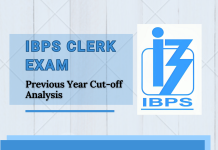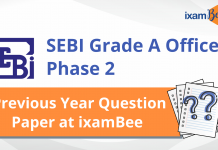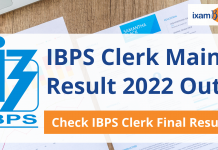As compared to urban areas, the pace of development in the rural areas has always been slow due to the lack of resources and institutions. Therefore, to promote the development of rural areas, to boost financial operations, and promote sustainable agriculture, the Government of India established the National Bank for Agricultural and Rural Development (NABARD).
NABARD is responsible for regulating India’s rural banking system and hence, it is considered as a ‘development finance institution’. It works on three main areas- Finance, Development and Supervision. So, to enhance the rural development of the country, this bank provides and regulates credit to rural areas.
Moreover, to ensure that the rural development of the country happens smoothly, NABARD conducts a recruitment drive every year to recruit eligible candidates in Grade A and Grade B. Therefore, NABARD Grade A and Grade B exam is one of the most sought after exams in India. Thousands of candidates appear every year to realize their dream of becoming a NABARD Grade A or Grade B officer. Before applying for any such exam, it is really important for you to get familiarised with the organization first. Knowing the organization, its functions, and many other things motivates you to apply for this exam and also lets you analyze whether you will be a great fit for this organizational role or not.
In this blog, we will go over all the details regarding what NABARD is, its role, functions, and schemes. This article will be quite helpful from the exam point of view, so we encourage you to read it till the end.

What is NABARD?
- NABARD stands for National Bank For Agriculture and Rural Development.
- It is a government organization with its headquarters in Mumbai, Maharashtra, and was formed on July 12, 1982.
- The main motive behind the establishment of this organization was working towards ‘development assistance’ and ‘poverty reduction’.
- The term ‘development assistance’ refers to the cooperation or financial aid provided by the government and other agencies to contribute to the overall development of the ‘developing countries’. This makes NABARD a ‘development finance institution’.
- It works closely in the field of credit for agriculture and other activities in rural areas in India. In other words, NABARD can be referred to as the main bank/regulatory body for rural development and agriculture in the country.
- NABARD has a number of offices spread across the country, having several departments, with each of them assigned specific objectives and responsibilities.
Establishment of NABARD
- Before NABARD came into existence, there existed an organisation called Agricultural Refinance and Development Corporation which was formulated with the view of providing refinancing facilities.
- Earlier RBI was actively linked and involved with agricultural finance which gradually started becoming difficult. Moreover, the Agricultural Refinance and Development Corporation (ARDC) was unable to fulfill the requirements of refinance.
- Therefore, RBI decided to distance itself from the agricultural finance and that’s when a committee was set up under Mr.Sivaraman who was its chairman. The recommendations given by Sivaraman committee were accepted and were followed for the formation of NABARD on 12th July 1982.
- The present Chairman of NABARD is: Dr. G.R. Chintala.
NABARD: Role & Functions
NABARD is the topmost development finance institution which deals with the development of rural areas of India. It is majorly responsible for sorting out the financial requirements of the rural India, especially the farmers. Some of the main responsibilities that NABARD is entrusted with are :
- NABARD provides refinance facility to the agricultural sector.
- It deals with the matters concerned with ‘policy, planning and operations’ in the agricultural sector and other developmental activities in rural India.
- It also takes care of the development of cottage industries, village industries, small scale industries and other rural industries.
- It also refinances the institutions that provide financial aid to the rural areas.
- It is also involved in training the institutions that are working towards the upliftment of the rural areas.
- It is also responsible for the implementation of the programmes aimed at rural development.
- Since NABARD is responsible for coordinating all the finance activities in the rural areas, it also has to stay in constant touch with all the important institutions like the RBI, Central Government, State Government or any other institution that may be involved in the ongoing agriculture and rural development activities.
- Regulation and supervision of the RRBs is another important role of NABARD. It supervises State Cooperative Banks (SCBs), District Cooperative Central Banks (DCCBs), and Regional Rural Banks (RRBs).
NABARD: Refinance Facility
Refinance as the name suggests is a finance facility provided ‘again’ by an institution to a borrower. It is the substitution of an existing loan with another loan on lower interest rates and different terms. To support the rural areas, NABARD provides refinance facility to promote capital infusion in the agriculture sector, with a repayment period of five years. These terms and conditions may vary according to the state or country. NABARD also receives its refinance funds from the World Bank and Asian Development Bank.
- NABARD has set up the Rural Innovation Fund with the help of Swiss Agency for Development and Cooperation.
- It has also initiated another scheme for banks which aims at rural development called Rural Infrastructure Development Fund (RIDF).
- Till now Rs 51,283 Crore has already been sanctioned for 2,44,651 projects.
NABARD Schemes
Apart from providing credit for agriculture and promoting rural development, NABARD is also responsible for circulating its various schemes through banks and other credit-lending institutions across India.
Given below are the interest rates (as of April 2022) offered by NABARD for refinancing to banks and other credit-lending institutions under the NABARD Scheme.
| Short Term Refinance Assistance |
4.50% for the following institutions:
5.50% for ST – Additional SAO/ST(Others)/ ST (SAO ) -SCARDBs (Annual Product) 8.10% for StCBs/RRBs – Conversion of Short Term – Crop loans into Medium Term loans |
| Long Term Refinance Assistance |
5.80% – Long Term loan to State Government for contribution to share capital of cooperative credit institutions |
| Regional Rural Banks (RRBs) & State Cooperative Banks (StCBs) |
6.40% – Refinance for 5 years and above 6.00% – Refinance for 3 years to less than 5 years 5.50% – Refinance for 18 months to less than 3 years |
| State Cooperative Agriculture and Rural Development Banks (SCARDBs) |
6.45% – Refinance for 5 years and above 6.05% – Refinance for 3 years to less than 5 years 5.55% – Refinance for 18 months to less than 3 years |
| Direct Lending |
Bank Rate – 1.50% |
Please Note-
- The interest rates are subject to change at the sole discretion of NABARD and RBI.
- Also, these interest rates do not include GST and Service tax.
Features of NABARD Scheme
- To build infrastructure in rural areas.
- Providing support through funding or refinancing.
- Prepare credit plans at the district level.
- To provide directions and support to the banking sector to achieve their credit targets.
- Supervising the functioning of Cooperative banks and RRBs.
- To implement government’s rural development schemes.
- Conceive new projects that encourage rural development of the country.
- Training and promoting handicraft artisans.
Loans & Funds under the NABARD Scheme
Direct Finance Schemes
- Loans for Food Parks and Food Processing Units in Designated Food Parks
- Loans to Warehouses, Cold Storage, and Cold Chain Infrastructure
- Credit Facilities to Marketing Federations
- Rural Infrastructure Development Fund
- Direct Refinance to Cooperative Banks
- Supporting Producer Organisations
- Alternative Investment Funds
- Long Term Irrigation Fund
- Pradhan Mantri Aawas Yojana – Grameen (PMAY-G)
- Swachh Bharat Mission-Gramin (SBM-G)
- Micro Irrigation Fund
Refinance Schemes
- Short Term Refinance
- Long Term Refinance
- Eligible schemes for Refinance under Off Farm Sector
Schemes for Farmers
- Producers Organisation Development Fund (PODF)
- Watershed Development Programme
- Tribal Development Programme
- Dairy Entrepreneurship Development Scheme
- Capital Investment Subsidy Scheme for Commercial Production Units for organic/ biological Inputs
- Agriclinic and Agribusiness Centres Scheme
- National Livestock Mission
- GSS – Ensuring End Use of Subsidy Released
- Interest Subvention Scheme
- New Agricultural Marketing Infrastructure
- Formulation of Special Long Term Refinance Schemes
Off-Farm Sector Schemes
- Credit Linked Capital Subsidy Scheme
- NRLM / NULM (Deendayal Antyodaya Yojana)
- Weavers Package
Study with ixamBee for NABARD
NABARD Online Courses
The NABARD Grade A 2024 Recruitment is coming to an end as its interview process is going to start soon. Similarly, the NABARD Grade B Recruitment is yet to begin as well, so aspirants can look forward to the release of the recruitment notifications for both Grade A and B. You should be aware that in 2025, NABARD will release its NABARD Grade A and Grade B Notification at the desired time. It is better if you start preparing for it in advance. Therefore, to help you realize your goal of becoming a part of this prestigious organization, ixamBee is providing the NABARD Grade A Online Course and NABARD Grade B Online Course. Both these courses have been curated for you by our experts, who have first-hand experience in this field.
NABARD Mock Tests
Furthermore, we also encourage you to take the NABARD Grade A and Grade B Mock Tests. This will enable you stay updated with the latest question trend. Moreover, you will give you a clear picture of your exam preparation and performance.
We wish you the best always!!
ixamBee specializes in providing expert guidance and resources for banking exams 2024, ensuring that you are well-prepared for the Upcoming Bank Exams like RBI Grade B, NABARD Grade B, IBPS SO, and more. Our courses align with the bank exam calendar 2024, covering all the essential topics. With a focus on the upcoming bank jobs, our Previous Year Papers, BeePedia, SSC CGL, SSC CHSL, SSC MTS and other Mock Tests are designed to help you excel in upcoming banking exams.
Also Read:
Qualifying for NABARD 2025: 5 Expert Tips to Excel in the Exam
Preparation Strategy for NABARD GRADE A Prelims Exam
How to Study ARD and ESI for NABARD IT and Finance Exam
срочный займ под залог недвижимостизайм в евросетизайм с 18 лет онлайн












